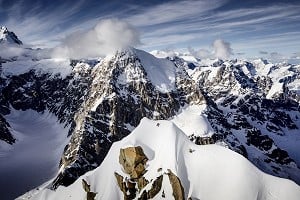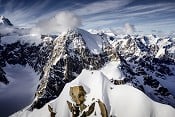

This week's Friday Night Video recently took home the Best Mountain Film award at Kendal Mountain Festival. The Ghosts Above sets out to solve the mystery of who climbed Everest first but ends up reflecting on the fraught relationship between guides and expeditions, the rigours of high altitude mountaineering and the commercialisation of a once sacred mountain.
Read more
Suprised you chose this.
Watched this earlier in the week and just found the whole thing monumentally distasteful. Ozturk essentially paying lip service to the issues surrounding Everest and then committing every sin he claims to have recognised. As if a degree of introspection gives him and the team carte blanche to act with impunity.
"If there's no peace with you we won't climb" - then they go ahead and do what they want regardless of the feelings of the sherpas. Just acknowledging that you're a colonialist without modifying your behaviour shouldn't be enough to salve your conscience. Paid or not and regardless of wealth and privilege disparity its not ok to lie to a climbing partner about your intentions on a route.
Some really beautiful footage, but I agree with the others that this film handles the politics of Everest climbing in a very feeble way. In true white upper-middle-class American fashion, it seems all about feeling guilty, rather than anything more concrete. The impression from the film is that, when all is said and done, this expedition was little different from any of the other wealthy tourist expeditions that happened that year. And... the search for Iriving seemed embarassingly perfunctory and poorly conceived - not least in trying to wing it without the Sherpas' approval.
I don't like to be negative but I think this film does not represent mountaineering well. Not only for the reasons discussed above, but for me it doesn't convey the camaraderie, sense of exploration and self-sufficiency that makes mountaineering worthwhile, instead favouring the overblown 'Americanised' narrative style, which seems insincere considering the team's actions. It could just be a cultural thing though and it's all too easy to sit and judge Everest from a distance. The cinematography is undoubtedly outstanding though, especially considering the filming conditions.
Well yeah..........
But a simply stunning piece of film-making. Utterly mesmerising.
I’d recommend this film, but with the sound turned off. The commentary is unnecessarily melodramatic - presumably to ‘sell’ it to a particular audience. Did it add to the narrative to say that they rested using corpses as back rests? Distasteful doesn’t come close. The style is equally jarring.
The ‘story’ is self serving and sanctimonious. It’s hardly surprising that the film makers don’t even appear to have realised how transparent their deception of the Sherpas actually is.
Turn off the sound and enjoy the imagery.
Maybe its a good film. Maybe it isn't. The Everest that appears in this film is absolutely littered with plastic bin bags, old shoes, broken bottles, unidentifiable bits of rubbish, shit everywhere, overrun like the Peak on a bad day. It looks like the 3rd world tip that it is, this proud playground for white 1st world manly tourism. What a stinking world of hypocracy we live in. There are no ghosts above, only tesco bags blowing in the wind, sqandrous market thinking and the garbage that it leaves behind.
Well said.
There are loads of inspiring films and photos that I've seen in the last months showcasing the amazing world we live in and the brilliant challenges and adventures that await after lockdown. This one just left me with a sense of wonderment about why anyone would want to go and jumar Everest. It just looks awful.
I thought it was a visually mesmerizing film. They've presented a really interesting and controversial story of their expedition. They didn't have to edit the film this way, they could have presented it very differently, possibly one which was more favorable to the western characters. But they didn't, and have instead presented a film where they can be shot at, and in doing so, I think have produced a film that illustrates the many contradictions associated with the mountain, most notably among themselves, as well as the Sherpas.
The one criticism I would make, is that I felt that the film suggested some sort of animist idea that the mountain itself was the corrupting source to their 'best' laid plans, or indeed towards the relationships/trust between westerners and Sherpas. So instead of ending on a wide angled time lapsed shot of the Himalaya, I think it would have been more honest to turn the camera on themselves and talk more about the corrupting culture they come from i.e. white, western, expansionist capitalism.
Ok, I'm going to shun the bandwagon and go out on a limb here and defend the film (even if not the fact that they were there at all).
Yes, the film makers are part of the problem but they didn't shy away from that fact. I thought it showed the expedition and the mountain brilliantly in all its contradictions; the mindblowing beauty alongside the squalor of abandoned camps, the Sherpas all too aware of the risks yet needing the summit on their CV, the ambition of the climbers alongside their reservations, the shock of the corpses on the way up giving way to exhausted indifference on the descent. It is easy to criticise the "American" introspection but I didn't think it was a too jarring on this occasion and rather came across as a refreshing honesty.
A magnificently shot, balanced and thought-provoking film.
Edit: Just seen scoth's post which I seem to have mirrored in many ways.
It's undeniably a visually beautiful film but I think what was lacking was some real introspection rather than just lip service.
> It's undeniably a visually beautiful film but I think what was lacking was some real introspection rather than just lip service.
For a 30 minute film I thought the depth and balance was about right.
Amazing filming and well captured.
> "If there's no peace with you we won't climb" - then they go ahead and do what they want regardless of the feelings of the sherpas. Just acknowledging that you're a colonialist without modifying your behaviour shouldn't be enough to salve your conscience. Paid or not and regardless of wealth and privilege disparity its not ok to lie to a climbing partner about your intentions on a route.
Well put. Amazed that this film was chosen.
> Just acknowledging that you're a colonialist
I haven't watched the video yet but when did America (or anyone else) colonise Nepal?
> sets out to solve the mystery of who climbed Everest first
I thought it was pretty generally accepted that Mallory and Irvine didn't? At least it seems to be accepted by most people other than film makers trying to cash in on the supposed mystery.
> > sets out to solve the mystery of who climbed Everest first
> I thought it was pretty generally accepted that Mallory and Irvine didn't? At least it seems to be accepted by most people other than film makers trying to cash in on the supposed mystery.
Whether they climbed it or not, finding Irvine's camera with photos in it would be very remarkable.
> I haven't watched the video yet but when did America (or anyone else) colonise Nepal?
Nepal was a Bitish Protectorate from 1816.
I understand (from a book I read while working in Nepal), Nepal wasn't colonised in the same way as India. The East India Company did make attempts to expand into Nepal, but this was resisted by some tough wee warriors. The would be colonisers responded with the full might of the British army, but instead of imposing colonial rule on Nepal, Nepal would be 'free' to govern itself in exchange for the warriors who defeated the East India Company (The Gurkhas).
Even so the process of neo-colonisation by western corporate powers (as well as Indian and more recently Chinese) has been ongoing in Nepal, especially since the 1950's .
I enjoyed this film, it showed the beauty of the mountains and why people go. It also showed the reason why you shouldn't go to Everest. Part of me is happy to see a film that takes away some of the sheen and glory of the 'achievement' of climbing Everest these days but I wouldn't want to see that industry undermined because of the money it brings to the area.
Before I pass comment on the treatment of the Sherpas I'd have to know what the beef was the Sherpas had with the team making their brief diversion, can anyone tell me? At least there was some intropection, I got the impression that they were otherwise sensitive and understanding of the people and culture, probably more so than most visitors to the area.
> Before I pass comment on the treatment of the Sherpas I'd have to know what the beef was the Sherpas had with the team making their brief diversion, can anyone tell me?
I imagine the Sherpas feel that they are being paid to get the team as safely and as efficiently as possible up and down the mountain, so anything which distracts from that is seen as being potentially dangerous. There is also the fact that it seemed to have been agreed or implied beforehand that this would not happen.
Stunning film, sketchy commentary. The "look at me I'm such a sensitive hero" style is very grating.
The inclusion of historical footage was great. And the Tibetan comment that climbing was a form of greed struck a nerve.
I've not watched the video (yet) but I did read an article in National Geographic written by one of the Americans. It seems the Sherpas were not happy with the expedition going off the usual route & the expedition members agreed to go to the summit by the usual route up & down. Then on the way down one (or maybe more) of the expedition broke the agreement.
> I understand (from a book I read while working in Nepal), Nepal wasn't colonised in the same way as India. The East India Company did make attempts to expand into Nepal, but this was resisted by some tough wee warriors. The would be colonisers responded with the full might of the British army, but instead of imposing colonial rule on Nepal, Nepal would be 'free' to govern itself in exchange for the warriors who defeated the East India Company (The Gurkhas).
> Even so the process of neo-colonisation by western corporate powers (as well as Indian and more recently Chinese) has been ongoing in Nepal, especially since the 1950's .
Thanks. I've not read much about the British stance towards Nepal but knew it wasn't an actual colonisation as happened in India. I'm not so sure about your last statement ('neo-colonisation by western corporate powers'). Surely, this is simply modernisation ie Nepal transitioning from a medieval monarchy and joining the twentieth century with all its material and medical advances. I've trekked around Langtang and Annapurna and saw people who were quite happy to embrace modernity with no wish to live in rural poverty. If Nepal can exploit it's natural wonders to make money and Westerners are prepared to pay to go and see then that's fine by me. We do the same with our national parks.
Maybe you should watch the film? "Colonialist" is the word that Renan Ozturk uses to describe himself.
> Maybe you should watch the film? "Colonialist" is the word that Renan Ozturk uses to describe himself.
Has he sent his army in to subdue the Nepalis recently? Or is he just beating himself up for being wealthier than them? By the way, I was very impressed with the entrepreneurial spirit of the Nepalis. At Manang they told me that the men would fly to Hong Kong to trade while the women ran the teashops and guest houses and send the kids to school in Kathmandu. They're not colonised by anyone just making a living in the modern world like the rest of us.
Your right, I'm sure there are many doing alright. I met and lived with some Nepalis who were doing pretty well. But still, for the vast majority of Nepali people, the 'positive'; aspects of modernity have not yet reached them - well that's what I experienced 5 years ago.
Neo-colonialism looks different, but essentially it's the same, it's the process of extracting wealth, but in the west we call it 'development' .
Wealth continues to be extracted from the country all the time, and in a variety of ways. One way, (and this may have changed since when I was last there), Nepal could generate enough electricity to supply it's own demand, but daily load shedding still occurred. The reason, Indian energy companies (backed by global finance) extract energy directly out of Nepal through various hydro schemes built in the mountains.
The reason why they were built is complicated. As is the politics of Nepal, but it's really interesting. There is definitely push back on foreign intervention though, sometimes this comes out within the mountaineering industry.
Actually I don't know why we are talking about Nepal, pretty sure the film was set on the Tibet side?!
Totally agree, the accompanying NatGeo documentary 'Lost on Everest', that Ozturk was part of, has some beautiful and unique shots of the north face using a high altitude drone. But, the treatment of the Sherpas was out of order and as you say 'the search' was pretty embarrassing.
Another expedition in the 2019 seasons was also on the mountain doing a search for Irvine. Initiated by Jake Norton (who was part of the 1999 search team along with Conrad Anker, which found Mallorys body). That expedition was guided by Adrian Ballingers Alpenglow Expeditions. Their search was documented on Discovery+ documentary 'Everests Greatest Mystery'. I think theirs was a much better motivated and the search conducted better, although with some strange choices.
I think that for a lot of the folks interested in the Mallory and Irvine mystery the jury is still out. The mainstream idea that they probably didn't make it arose, I think, from Conrad Ankers expeditions and the generally promoted view that they were set on ascending via the NE-ridge.
There is scant evidence that this was ever Mallorys planned route of ascent, it seems more likely they chose to attempt the the route Edward Norton had tried a few days before and achieved his remarkable oxygenless highpoint.
> I imagine the Sherpas feel that they are being paid to get the team as safely and as efficiently as possible up and down the mountain, so anything which distracts from that is seen as being potentially dangerous. There is also the fact that it seemed to have been agreed or implied beforehand that this would not happen.
In that case I really don’t have too much problem with what the American team did. Obviously, the Sherpas would have no way of knowing this but they were a lot safer and less likely to lose one of their charges being strapped to this team with a minor off piste diversion than they would be with most of the tourists they are usually tethered to who follow the rules.
The real shame is that there is no room to do anything other than jug up the fixed lines with the required ratio of Sherpas, like being told you can’t walk up Snowdon but have to take the train (I know that analogy doesn’t 100% work).
> The real shame is that there is no room to do anything other than jug up the fixed lines with the required ratio of Sherpas ...
Is that the case? Is it a requirement of any permit? People still make independent efforts, don't they? Or are those technically illegal?
Bear in mind that this ascent was from the northern side, so the regulations applying will have been Chinese ones.
> ... as you say 'the search' was pretty embarrassing.
I got the impression from the film that they had identified (from previous research) a very specific location in the Yellow Band, and that they did in fact visit that location on this trip, with a negative result.
That said, if they were already flying drones around, why didn't they do the search using those?
> Before I pass comment on the treatment of the Sherpas I'd have to know what the beef was the Sherpas had with the team making their brief diversion, can anyone tell me?
In the film it mentions that the Sherpas are in some way responsible for the safety of the clients. I'm not sure exactly in what way this is the case, is it a moral/ethical code or are there in some way penalties for them if a client is injured/killed? I don't know.
There was also a lot of talk about sanctions and blacklisting from the Chinese if they were to spend more than 12 hours above 8,300 m, again I'm not sure how the party were doing for time at the point at which they took a diversion but, the Sherpas were probably incredibly keen to get up and down in the quickest time possible to avoid any chance of straying beyond the 12 hour limit.
Aside from anything, the search was the most half arsed ever and tottering around at high altitude, unroped, off track and while severely fatigued having already been to the summit for such a feeble search doesn't seem to be the best plan.
The fact that they hadn't in any way discussed their plans with the Sherpas regarding their intentions of not going to the summit in the first place seemed to me to be piss poor.
Sure, they had identified a very specific search spot based on some sketchy speculation by Tom Holzell from looking at images taken from an aerial flyover. However, to only look at such a specific location seems like a pretty high risk strategy when the apparent sole purpose of the expedition was to find Irvine. Given only one member of the expedition went to search, after already summiting, and producing no evidence (in public at least) of the 'recess' they were looking for I'd say it was a pretty poor search effort. Not least because of the poor planning in presumably not even notifying Chinese authorities or Sherpa teams of their actual intentions.
The drone searches were thwarted somewhat by high winds higher up the mountain at some points but they apparently did manage to take 400+ Hi-Res images of the search area including a close up of the specific location, but to my knowledge these haven't been shown/released anywhere.






